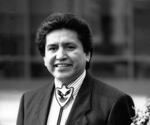This story originally appeared on Underscore.news.

Former chair of the Columbia River Inter-Tribal Fish Commission, Ted Strong, Yakama Nation, in this undated photo. He passed on Jan. 30, 2024 at 76 years old.
Courtesy of Columbia River Inter-Tribal Fish Commission
A pillar of many Indigenous communities across the Pacific Northwest, Yakama elder Ted Strong passed away on Jan. 30, 2024. He was 76 years old.
That same day, hundreds of Native community members gathered in Portland for the Affiliated Tribes of Northwest Indians Winter Convention. When word arrived that Strong had passed on, they took a moment of silence followed by an honor song from representatives of the Yakama Nation.
A leader, husband, father, grandfather and more, Strong was well-known and loved throughout his community.
Strong wore many hats, serving in a myriad of leadership roles. Perhaps most notably, he served as executive director of the Columbia River Inter-Tribal Fish Commission from 1990 to 1999, according to a memorial that ran on the CRITFC website. Following his tenure at the Columbia River Inter-Tribal Fish Commission, Strong served as chief judge of the Yakama Tribal Court and director of the Yakama Tribal Housing Authority. Most recently, he served as vice president of corporate responsibility at the Yakama Chief Hops Association.
“He was deeply imbued with the tribal culture and spiritual values and he wanted the staff, both Native and non, to really understand it and have it inform our work in a way it hadn’t until he got there,” said Laura Berg, public information manager at the Columbia River Inter-Tribal Fish Commission from 1981 to 1996.
As executive director of the Columbia River Inter-Tribal Fish Commission, composed of Yakama, Umatilla, Warm Springs and Nez Perce nations, Strong worked to strengthen tribal sovereignty and advocate for salmon restoration. Part of his lasting legacy there is the comprehensive restoration plan for upriver salmon that Strong directed staff to create and presented to Congress in 1996. Originally named the Tribal Restoration Plan, the plan was later amended and named “Wy-Kan-Ush-Mi Wa-Kish-Wit,” meaning “for the spirit of the salmon.”
“He was a visionary,” said Berg. “He saw the importance of science and excellence.”
The plan ties together traditional ecological knowledge and Western science in order to center a holistic approach to salmon restoration in the Columbia River Basin. The plan lays out goals and strategies to restore historical anadromous fish populations in perpetuity, according to the website.
As a champion of implementing strategies to advance ecosystem health, Strong needed to have a way with words and an ability to eloquently express the importance of prioritizing the rivers and the species that rely upon them. Throughout his career and advocacy work, Strong became well known for his ability to captivate a crowd with his speeches.
“I remember his remarks at the Pacific Northwest Forest Conference,” Berg said. “He had the traditional skill of an orator like nobody I’ve ever met.”
In 1993, President Bill Clinton called for a Northwest Forest Summit in Portland, Oregon to address controversy over the use of Pacific Northwest national forests. Strong addressed the room during the conference, representing tribes of the Pacific Northwest. Following his speech, President Clinton appointed Strong to the President’s Council on Sustainable Development, chaired by Vice-President Al Gore, according to the CRITFC website.
“Present day America is approximately 10 generations old,” Strong said in his speech. “For 690 generations, ecosystem management was defined, illustrated and scientifically concluded by each generation of American Indians living on this land. In our time as Natives on this land, our forests grew as many salmon as trees. In the short 10 generations, one broad sweep of the geological second hand, America has reduced its lifeforms to struggling endangered species.”
Sadly, his words still ring true today. But the fight for ecological restoration and the health of the salmon continues — a fight Strong deeply influenced.
Underscore is a nonprofit collaborative reporting team in Portland focused on investigative reporting and Indian Country coverage. It is supported by foundations, corporate sponsors and donor contributions. Follow Underscore on Facebook and X.